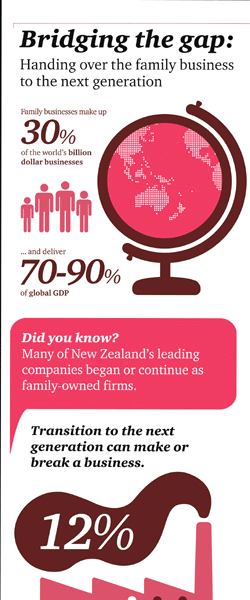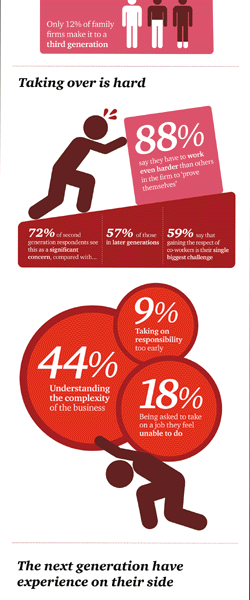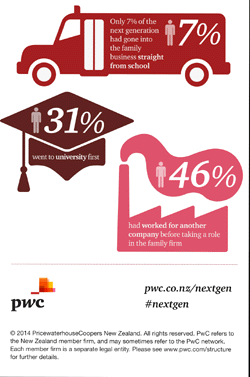
Content supplied by PwC
Passing control from one generation to the next can make or break a family business; and as New Zealand’s ‘baby boomers’ hand over to ‘millennials’, the risks of getting it wrong have never been greater.
The new PwC research Bridging the gap: Handing over the family business to the next generation is based on its conversations with more than 200 local and global family business members, and it warns next generation family business owners need more support – especially if they’re to follow the success of the many leading New Zealand companies that began or continue as family-owned firms.
PwC Partner and Private Business Market Leader Robbie Gimblett says, “A family business transition can be likened to a game of tug of war, particularly given the nature of the family business model where some owners rarely retire."
“The next generation can be ambitious and full of ideas for change and growth, yet many expect to remain in a state of limbo and frustration. More than two-thirds tell us the current generation will find it tough to let go. We came across businesses where the next generation are in their sixties and their father is still running the show in his eighties,” adds Mr Gimblett.
The survey finds there is a tendency for some in the older generation to overestimate how well they have run the business, while underestimating their children’s ability to do this as competently as they did."
“Many New Zealand family firms face big challenges to their business models given the pace of change regarding global forces, like technological advances, demographic changes and economic power shifts. The children of the older generation wish their parents would embrace technology and be open to new ideas. With the pace of change accelerating, it may be time to give the next generation more credit and control,” advises Mr Gimblett.
The report also finds the risks to the family business, or indeed family relationships, are stacked against a successful transition: only 12 per cent of family firms make it to the third generation, with the handover for ‘first generation’ businesses even more fraught.
“The issues are most marked for those taking over from the founding owner. Twenty per cent of the next generation in these circumstances tell us they’re not looking forward to running the family business, compared to less than 10 per cent of respondents as a whole,” says Mr Gimblett.
The survey found one of the biggest challenges for the next generation is establishing credibility with colleagues, employees and customers, noted as a concern by 59 per cent.
“Credibility is hard won, with the significant majority saying they have to work harder than others to gain respect and prove they’re more than the boss’s son or daughter. And even with that hard work, promotion to CEO is also no longer automatic for the next generation, with only 35 per cent confident they would one day have this role."
“The family way of doing business has unique strengths but also unique challenges, as it isn’t always easy working with people you’re related to. The next generation want the family business to focus more on planning for succession and having conversations that address roles, responsibilities and timings early to ensure their businesses are successful for generations. Interesting times ahead,” concludes Mr Gimblett.
---------------------------------------------
Methodology: 207 interviews were conducted with the next generation members likely to take over the family business in 21 countries – including 11 from New Zealand – with a focus on those with a sales turnover of more than US$5m. The companies were drawn from a range of sectors, with most of the sample having taken part in the 2012 PwC Family Business Survey. The interviews were conducted between 3 February and 14 March 2014 by Kudos Research, and the results analysed by Jigsaw Research.



We welcome your comments below. If you are not already registered, please register to comment
Remember we welcome robust, respectful and insightful debate. We don't welcome abusive or defamatory comments and will de-register those repeatedly making such comments. Our current comment policy is here.